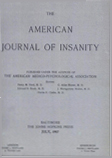THE EFFECT OF NICOTINIC ACID IN STUPOR, LETHARGY AND VARIOUS OTHER PSYCHIATRIC DISORDERS
Abstract
Thirty-eight patients in stuporous states or in active psychoses without evident cause showed prompt and often very impressive improvement after treatment with nicotinic acid.
The usual criteria for the clinical diagnosis of pellagra or of other deficiency syndromes were absent.
This experience leads us to believe that many patients whose psychiatric status suggests the diagnosis of toxic psychosis or exhaustion delirium may be relieved of their symptoms by the administration of nicotinic acid. It is believed that in such cases and in cases who show unexplained clouding of consciousness a therapeutic trial of nicotinic acid is the only means available by which one can determine whether or not the psychosis is due to avitaminosis.
In some exceptional cases, even when clinical evidence of pellagra is absent, extremely large amounts of nicotinic acid are necessary to obtain satisfactory results.
Access content
To read the fulltext, please use one of the options below to sign in or purchase access.- Personal login
- Institutional Login
- Sign in via OpenAthens
- Register for access
-
Please login/register if you wish to pair your device and check access availability.
Not a subscriber?
PsychiatryOnline subscription options offer access to the DSM-5 library, books, journals, CME, and patient resources. This all-in-one virtual library provides psychiatrists and mental health professionals with key resources for diagnosis, treatment, research, and professional development.
Need more help? PsychiatryOnline Customer Service may be reached by emailing [email protected] or by calling 800-368-5777 (in the U.S.) or 703-907-7322 (outside the U.S.).



